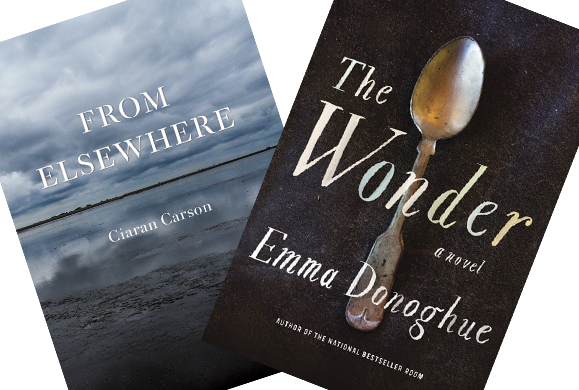Books of Irish and Irish American interest.
℘℘℘
From Elsewhere
By Ciaran Carson
In a new collection of translations, Belfast poet Ciaran Carson tackles the late modern poetry of Jean Follain, a poet/lawyer of whom Carson refreshingly admits in the introduction he was unaware until the age of Internet, where he had to look him up.
That two poets whose lives overlapped for a generation and who are preoccupied with similar problems of linguistic malleability and concision, memory formation, and, eventually for Carson, post-war reconciliation, should be bound together seems inevitable, if ironic, now that it has been done. Follain believed in speaking no other language than his native French and that translation was impossible; Carson has translated from French, Irish, Italian, and more. But “translation” has always been a loose word for him – he’s an easy target for reviewers, absent Italian, who want to know what Dante said, rather than how he could have said it now. As if to anticipate these attacks, Carson presents two versions of Follain’s poems in translation in From Elsewhere – the “original” translation on the left, and on the facing page, his responsive, explicating “translation.”
From Elsewhere doesn’t purport to be a book of literal translations, and it shouldn’t be taken as one. Instead, understand it as a unique associative web of meanings, culminating in a comprehensive meditation on loss and recovery. What Carson does best in this collection is explicate Follain’s short weighty poems (all of them hover around a dozen lines) like a flautist (which Carson also is) bringing the emotional depth of a theme to the surface. A poem about a hotel key becomes a short story of a tragic insomniac; a line about the town butcher becomes a meditation on the reality of butchery; a boy startling at a sudden rumble becomes a man unable to recall when a specific terrorist attack occurred, or how many died. In each pair something vanishes – such is the deficit of translation – between the “original” and the “translation,” whether a literal hotel key disappearing from one version to another or a figurative loss of innocence that braids the two versions together. Each pair together, and together all the pairs, formulate a surprising and evocative look at two poets whose trains passed in the night.
– Adam Farley
(Wake Forest UP / 192 pages / $15.95)
The Wonder
By Emma O’Donoghue
Of all of the praise garnered by Emma O’Donoghue’s 2010 novel Room, perhaps the most emphatic was that of the touching realism with which she created the voice of Jack, a five-year-old boy held prisoner with his mother in the very room where he was born. Her uncanny ability to capture the ways of a child shines again in The Wonder, which tells the story of Anna O’Donnell, a devout 11-year-old who claims to have lived without food for four months, causing religious pilgrims to flock to her mid-19th century village in the Irish midlands. Also pulled to her side is Lib Wright, the novel’s narrator and skeptical English nurse, trained by Florence Nightingale, sent across the Irish Sea with orders to keep Anna under strict surveillance and discover the “elaborate trick” at the heart of her fast.
If the mystery behind the girl’s apparent ability to subsist only on drops of water and “manna from heaven” is the initial hook of The Wonder, its backbone is formed of the shift in emotional dynamic between the watcher and the watched. In a town where “everybody was a repository of secrets,” upright Lib and serene Anna guard their own carefully, but as the observation continues and Anna’s health begins to deteriorate, the nurse quickly becomes entangled in the unseen histories of the O’Donnell family.
Set only a handful of years after the end of the Great Hunger, the novel and its characters teem with the richness of old country life: Anna comes from a farming home and is watched closely by members of the clergy, the village doctor, and William Byrne, an urbane Irish Times journalist sent from Dublin to report on the “magical girl who lives on air.” Lib, a lapsed member of the Church of England, finds Irish Catholic traditions as alien and uncomfortable as the local rumors of fairy folk living off the beaten track. However, as her friendship with Anna blooms through riddles and guessing games, her determination to uncover the truth only grows.
“Better to drown in the surf than stand idly on the shore,” Nurse Nightingale once advised Lib. “So tell me, are you ready for this good fight? Can you throw your whole self into the breach?” In this, our heroine (and The Wonder itself) does not hesitate.
– Olivia O’Mahony
(Little, Brown and Company / 291 pages / $27)


Leave a Reply